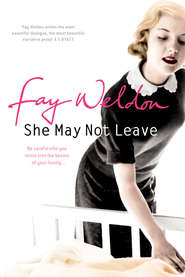По всем вопросам обращайтесь на: info@litportal.ru
(©) 2003-2024.
✖
Watching Me, Watching You
Автор
Год написания книги
2018
Настройки чтения
Размер шрифта
Высота строк
Поля
There were patients waiting. They had migraines, eczema and boils. He gave her more Valium, which she did not take.
Deidre, or some expression of Deidre, went home and churned up the lawn and tore the gate off its hinges. The other Deidre raked and smoothed, resuscitated and blamed a perfectly innocent child for the gate. A child. It would have taken a forty-stone giant to twist the hinges so, but no one stopped, fortunately, to think about that. The child went to bed without supper for swinging on the vicar’s gate.
The wound on Deidre’s finger gaped open in an unpleasant way. She thought she could see the white bone within the bloodless flesh.
Deidre went upstairs to the bathroom, where David washed his wife’s blood from his grandmother’s hankie. ‘David,’ said Deidre, ‘perhaps I should have a stitch in my finger?’
David had the toothmug in his hand. His jaw was open, his eyes wide with shock. He had somehow smeared toothpaste on his black lapel. ‘The toothmug has recently been broken, and very badly mended. No one told me. Did you do it?’
The toothmug dated from the late eighteenth century and was worn, cracked and chipped, but David loved it. It had been one of the first things to go, and Deidre had not mended it with her usual care, thinking, mistakenly, that one more crack amongst so many would scarcely be noticed.
‘I am horrified,’ said David.
‘Sorry,’ said Deidre.
‘You always break my things, never your own.’
‘I thought that when you got married,’ said Deidre, with the carelessness of desperation, for surely now David would start an inspection of his belongings and all would be discovered, ‘things stopped being yours and mine, and became ours.’ ‘Married! You and I have never been married, not in the sight of God, and I thank Him for it.’
There. He had said what had been unsaid for years, but there was no relief in it, for either of them. There came a crash of breaking china from downstairs. David ran down to the kitchen, where the noise came from, but could see no sign of damage.
He moved into the living room. Deidre followed, dutifully.
‘You’ve shattered my life,’ said David. ‘We have nothing in common. You have been a burden since the beginning. I wanted a happy, warm, loving house. I wanted children.’
‘I suppose,’ said Deidre, ‘you’ll be saying next that my not having children is God’s punishment?’
‘Yes,’ said David.
‘Nothing to do with your mumps?’
David was silent, taken aback. Out of the corner of her eye Deidre saw the Ming vase move. ‘You’re a sadistic person,’ said David eventually. ‘Even the pains and humiliations of long ago aren’t safe from you. You revive them.’
‘You knew all the time,’ said Deidre. ‘You were infertile, not me. You made me take the blame. And it’s too late for me now.’
The Ming vase rocked to the edge of the shelf: Deidre moved to push it back, but not quickly enough. It fell and broke.
David cried out in pain and rage. ‘You did it on purpose,’ he wept. ‘You hate me.’
Deidre went upstairs and packed her clothes. She would stay with her mother while she planned some kind of new life for herself. She would be happier anywhere in the world but here, sharing a house with a ghost.
David moved through the house, weeping, but for his treasures, not for his wife. He took a wicker basket and in it laid tenderly — as if they were the bodies of children — the many broken and mended vases and bowls and dishes which he found. Sometimes the joins were skilful and barely detectable to his moving forefinger: sometimes careless. But everything was spoilt. What had been perfect was now second-rate and without value. The finds in the junk shops, the gifts from old ladies, the few small knick-knacks which had come to him from his dead mother — his whole past destroyed by his wife’s single-minded malice and cunning.
He carried the basket to the kitchen, and sat with his head in his hands.
Deidre left without saying another word. Out of the door, through the broken garden gate, into the night, through the churchyard, for the powers of the dead disturbed her less than the powers of the living, and to the bus station.
David sat. The smell of rot from the sink drawer was powerful enough, presently, to make him lift his head.
The cold tap started to run. A faulty washer, he concluded. He moved to turn it off, but the valve was already closed. ‘Deidre!’ he called, ‘what have you done with the kitchen tap?’ He did not know why he spoke, for Deidre had gone.
The whole top of the dresser fell forward to the ground. Porcelain shattered and earthenware powdered. He could hear the little pings of the Eucharist bell in the church next door, announcing the presence of God.
He thought perhaps there was an earthquake, but the central light hung still and quiet. Upstairs heavy feet bumped to and fro, dragging, wrenching and banging. Outside the window the black trees rocked so fiercely that he thought he would be safer in than out. The gas taps of the cooker were on and he could smell gas, mixed with fumes from the coal fire where Deidre’s darning had been piled up and was now smouldering. He closed his eyes.
He was not frightened. He knew that he saw and heard these things, but that they had no substance in the real world. They were a distortion of the facts, as water becomes wine in the Communion service, and bread becomes the flesh of the Saviour.
When next he opened his eyes the dresser was restored, the socks still lay in the mending basket, the air was quiet.
Sensory delusions, that was all, brought about by shock. But unpleasant, all the same. Deidre’s fault. David went upstairs to sleep but could not open the bedroom door. He thought perhaps Deidre had locked it behind her, out of spite. He was tired. He slept in the spare room, peacefully, without the irritant of Deidre’s warmth beside him.
In the morning, however, he missed her, and as if in reply to his unspoken request she reappeared, in the kitchen, in time to make his breakfast tea. ‘I spent the night in the hospital,’ she said. ‘I went to casualty to have a stitch put in my finger, and I fainted, and they kept me in.’
Her arm was in a sling.
‘I’m sorry,’ he said. ‘You should have told me it was a bad cut and I’d have been more sympathetic. Where did you put the bedroom key?’
‘I haven’t got it,’ she said, and the teapot fell off the table and there were tea and tea leaves everywhere, and, one-armed, she bungled the business of wiping it up. He helped.
‘You shouldn’t put breakables and spillables on the edge of tables,’ he reproached her. ‘Then it wouldn’t happen.’
‘I suppose not.’
‘I’m sorry about what I may have said last night. Mumps are a sore point. I thought I would die from the itching, and my friends just laughed.’
Itching? Mumps?
‘Mumps is the one where you come out in red spots and they tie your hands to stop you scratching?’
‘No. That’s chickenpox,’ she said.
‘Whatever it was, if you’re over fourteen you get it very badly indeed and it is humiliating to have your hands tied.’ ‘I can imagine.’
He wrung out the dishcloth. The tap, she noticed, was not dripping. ‘I’m sorry about your things,’ she said. ‘I should have told you.’
‘Am I such a frightening person?’
‘Yes.’
‘They’re only things,’ he said, to her astonishment. The house seemed to take a shift back into its ordinary perspective. She thought, that though childless, she could still live an interesting and useful life. Her friends with grown-up children, gone away, complained that it was as if their young had never been. The experience of childrearing was that, just that, no more, no less. An experience without much significance, presently over; as lately she had experienced the behaviour of the material world.
David insisted that Deidre must surely have the bedroom key, and was annoyed when she failed to produce it. ‘Why would I lock you out of the bedroom?’ she asked.
‘Why would you do anything!’ he remarked dourly. His gratitude for her return was fading: his usual irritation with her was reasserting itself. She was grateful for familiar ways, and as usual animated by them.
He went up the ladder to the bedroom window, and was outraged. ‘I’ve never seen a room in such a mess,’ he reported, from the top of the ladder, a figure in clerical black perched there like some white-ruffled crow. ‘How you did all that, even in a bad temper, I can’t imagine!’
The heavy wardrobe was on its side, wedged against the door: the bed was upside down: the chairs and light bulb broken, and the bedclothes, tumbled and knotted, had the same stretched and strained appearance as David’s socks; and the carpet had been wrenched up, tossing furniture as it lifted, and wrung out like a dishcloth.











